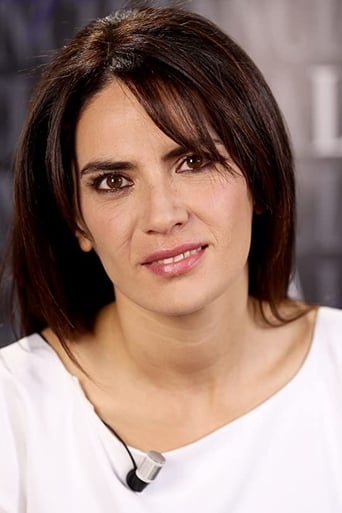Protraph
Lack of good storyline.
Lumsdal
Good , But It Is Overrated By Some
MusicChat
It's complicated... I really like the directing, acting and writing but, there are issues with the way it's shot that I just can't deny. As much as I love the storytelling and the fantastic performance but, there are also certain scenes that didn't need to exist.
AutCuddly
Great movie! If you want to be entertained and have a few good laughs, see this movie. The music is also very good,
nmegahey
It's a bit of a challenge to take on and get across the full impact of the Marzabotto massacre, the worst war-time atrocity committed in Italy during WWII, and director Giorgio Diritti takes a bit of a risk in L'uomo che verrà (The Man who will Come) by viewing events from the perspective of an 8 year old girl. The approach however neither shies away from the very real horror of the events of September 1944 nor sentimentalises them, but presents the story in a shockingly realistic and matter-of-fact way.Life in the Monte Sole region of Italy, in the mountains south of Bologna, is difficult enough for the inhabitants of the small farming community in the winter of 1943. The work is hard, the people live in poverty and are put under further strain by the taxes and regulations of the fascist government. The pact between Mussolini and Hitler however has just broken down and the German troops who patrol the region have suddenly become a more threatening presence.For the first half of the film we only get a sense of this from the perspective of Martina, an 8 year old girl. Unaware of what is really going on, her view is one of an innocent gradually coming to an awareness of the nature of the world. No longer speaking since the death of her baby brother, Martina is a silent witness to the world around her, to the struggle to survive. Most of her experiences are typical of childhood; she's bullied at school, is gradually becoming aware of what goes on between men and women, and is looking forward to her mother giving birth to a new baby.On the other hand, Martina also experiences horrors no child should ever be expected to witness. She sees German troops ambushed and prisoners being executed in the woods, hears the bombardment of Bologna, and experiences first-hand the events of the 28th and 29th September 1944 when she is rounded up with the other villagers by a Waffen SS unit. Accused of sheltering the Partisan units hiding out in the woods who have been attacking their patrols, the SS brutally execute around 770 citizens of Marzabotto; men, women and children alike.This horrifying true-life event is filmed by director Giorgio Diritti without sentimentality and without exaggeration and it's all the more shocking for it. Despite the necessity of having to create a fictional family and present a child-like narrative viewpoint as a way to navigate through the events, L'uomo che verrà nonetheless is unmanipulative and has an authentic feel for the period, the poverty and the hardship experienced, sparing the viewer little of the horror of what really happened in the region in 1944. L'uomo che verrà won the Best Film award in Italy's 2010 David di Donatello awards.
BaronVonCount
This movie is mostly seen through the eyes of the young girl, Martina, who along with the other children provides a depth of innocence which is the counterpoint to the ice-cold brutality of an invading army. The various viewpoints and behaviour of the diverse groups: villagers - old and young; partisans living in the woods;the clergy; the invading forces with their various levels of humanity from ruthless soldiers whose souls are dead to those who can't help but feel compassion for the people they are invading, never seem clichéd even though they may be in so many war movies. This is simply humanity at war, portrayed clearly and credibly without the slightest pretence. The cinematography, direction and acting are supremely natural, creating a fine, memorable movie.
SnoopyStyle
It's Dec 1943 in rural Italy. Martina is a young girl who has stopped talking. The other kids pick on her. Her mother is pregnant after the lost of her baby brother. Her family works the family farm living under the Nazi occupation. Some of the villagers support the Partisans led by Wolf. The fighting between the Partisans and the Nazis escalate. The Germans round up the locals and massacre them. Martina survives the mass killings and find her newborn brother as the historical event takes place.This takes a lesser known story, outside of Italy, and brings it onto the big screen from the point of view of a child. It is beautifully shot. The story meanders early on but the little girl is compelling enough to keep it interesting. The massacre itself is a rolling train of horrifying events. It's important to tell the tale and this does a good job doing it with beauty and sincerity.
am0807
Between September 29 and October 5 1944 on Monte Sole, an area of the Appenine Mountains near Bologna, S.S. Officer Weder reported "the execution of 728 bandits." These "bandits" were in fact around 770 civilian inhabitants of the area - women, priests, the elderly, and over two hundred children - who were systematically killed by the local SS troops in a sweeping reprisal for partisan activity in the area. "L'Uomo Che Verrà" ("The Man Who Will Come") re-enacts the event through the eyes of a young girl who observes the world in silence.Working oneself up to seeing such a film is nearly always a task - we know how it will end, and we know it will be devastating. But as the beginning of the film focuses on the everyday lives of Martina (a little girl gone mute ever since her baby brother died in her arms) and her family, one almost forgets the film's grim destination. Almost.The film is fanatically, sometimes brutally, devoted to portraying real life. There are no heroes (except for perhaps Martina herself), and very few clear villains (except for perhaps one or two of the SS who mark themselves out); there is no love story, and, eventually, no easy release from the horror. The partisans are neither heroic saviors nor selfish bandits; merely men who are waging battle against the invaders, sometimes committing ugly acts as a matter of course. The colors in the cinematography sometimes resemble old photographs, the clothes are dirty, torn, and in the case of the little girl, almost outgrown, and, realistically, nearly all the dialog is spoken in Bolognese dialect, which is so foreign from standard Italian that nearly the entire movie is subtitled in Italian for the benefit of audiences on the rest of the peninsula.It is also beautiful. The cinematography shows the Appenines in all their green, stark glory, and the moments of happiness and peace and laughter that the family find even in wartime, though they contribute to the realism rather than soften it, render the film bearable and lend it beauty.While we in the Western hemisphere are aware of the horrors of Holocaust, Normandy, and war the Pacific, the ugly and frequently horrifying Italian front has long gone ignored or forgotten. Once this film is released with English subtitles, with any luck, this omission might be remedied.




